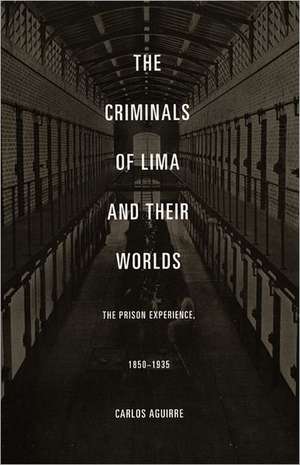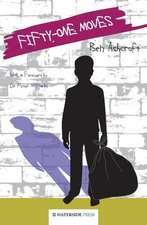The Criminals of Lima and Their Worlds – The Prison Experience, 1850–1935
Autor Carlos Aguirreen Limba Engleză Paperback – 26 ian 2005
Preț: 264.26 lei
Nou
Puncte Express: 396
Preț estimativ în valută:
50.57€ • 54.07$ • 42.16£
50.57€ • 54.07$ • 42.16£
Carte tipărită la comandă
Livrare economică 18 aprilie-02 mai
Preluare comenzi: 021 569.72.76
Specificații
ISBN-13: 9780822334699
ISBN-10: 0822334690
Pagini: 328
Ilustrații: 10 b&w photographs, 15 tables
Dimensiuni: 159 x 233 x 23 mm
Greutate: 0.45 kg
Ediția:New.
Editura: MD – Duke University Press
ISBN-10: 0822334690
Pagini: 328
Ilustrații: 10 b&w photographs, 15 tables
Dimensiuni: 159 x 233 x 23 mm
Greutate: 0.45 kg
Ediția:New.
Editura: MD – Duke University Press
Recenzii
"A superbly researched and written book. . . . Aguirre's work contributes not only to our understanding of the Peruvian situation, but also provides an invaluable comparative perspective."--Kristin Ruggiero, The Americas"A broad ranging and highly rewarding study. . . . Aguirre's book helps pave the way for a new history of . . . Peru's modern period. . . . This book is not only a superb social and cultural history of Lima's prisons, but also a brilliant and challenging example of how some of the key issues in Peruvian history can be addressed."--Paulo Drinot, Journal of Latin American StudiesAguirres book is well organized and well written. It constitutes a model of how to combine in one investigation diverse sources, quantitative and qualitative methods, and levels of analysis. --Iván Molina-Jiminéz, American Historical ReviewThough the book steeps the reader in details, transporting her to a time and place that may be unfamiliar for many readers, it is accessible to nonspecialists and will no doubt enlighten many--not only about the history of Limas prisons but also about punishment and society in settings that are likely unfamiliar for many US readers. --Angelina Snodgrass Godoy, Punishment & SocietyThis is a well-researched historical understanding of institutions and confinement in Peru. A major strength of this book is providing readers with key issues that are generally raised in the field of corrections while appreciating the importance of using a contextual framework
.--Pamela Schram, International Criminal Justice ReviewA pathbreaking study of state punishment in Peru. . . .--Carolyn Strange, Radical History ReviewMany historians and most Latin Americanists will find this book engaging even if they lack interest in criminology. . . . Carlos Aguirre addresses much more than the criminals of Lima and their world, giving readers an understanding of Peruvian society far beyond the walls of its prisons. . . . Aguirre has produced a work of impressive research. He analyzes a variety of topics, both broad and narrow in scope, and the completion of this difficult task merits commendation. This book contributes significantly to the understanding of Peruvian criminology, the penal system and Peruvian society in general.-- Michael Perri, Journal of Social History"This book contributes significantly to the understanding of Peruvian criminology, the penal system and Peruvian society in general."--Journal of Social History
"A superbly researched and written book... Aguirre's work contributes not only to our understanding of the Peruvian situation, but also provides an invaluable comparative perspective."--Kristin Ruggiero, The Americas "A broad ranging and highly rewarding study... Aguirre's book helps pave the way for a new history of ... Peru's modern period... This book is not only a superb social and cultural history of Lima's prisons, but also a brilliant and challenging example of how some of the key issues in Peruvian history can be addressed."--Paulo Drinot, Journal of Latin American Studies "Aguirre's book is well organized and well written. It constitutes a model of how to combine in one investigation diverse sources, quantitative and qualitative methods, and levels of analysis." --Ivan Molina-Jiminez, American Historical Review "Though the book steeps the reader in details, transporting her to a time and place that may be unfamiliar for many readers, it is accessible to nonspecialists and will no doubt enlighten many--not only about the history of Lima's prisons but also about punishment and society in settings that are likely unfamiliar for many US readers." --Angelina Snodgrass Godoy, Punishment & Society "This is a well-researched historical understanding of institutions and confinement in Peru. ... A major strength of this book is providing readers with key issues that are generally raised in the field of corrections while appreciating the importance of using a contextual framework..."--Pamela Schram, International Criminal Justice Review "A pathbreaking study of state punishment in Peru..."--Carolyn Strange, Radical History Review "Many historians and most Latin Americanists will find this book engaging even if they lack interest in criminology... Carlos Aguirre addresses much more than the criminals of Lima and their world, giving readers an understanding of Peruvian society far beyond the walls of its prisons... Aguirre has produced a work of impressive research. He analyzes a variety of topics, both broad and narrow in scope, and the completion of this difficult task merits commendation. This book contributes significantly to the understanding of Peruvian criminology, the penal system and Peruvian society in general."-- Michael Perri, Journal of Social History "This book contributes significantly to the understanding of Peruvian criminology, the penal system and Peruvian society in general."--Journal of Social History
"A superbly researched and written book... Aguirre's work contributes not only to our understanding of the Peruvian situation, but also provides an invaluable comparative perspective."--Kristin Ruggiero, The Americas "A broad ranging and highly rewarding study... Aguirre's book helps pave the way for a new history of ... Peru's modern period... This book is not only a superb social and cultural history of Lima's prisons, but also a brilliant and challenging example of how some of the key issues in Peruvian history can be addressed."--Paulo Drinot, Journal of Latin American Studies "Aguirre's book is well organized and well written. It constitutes a model of how to combine in one investigation diverse sources, quantitative and qualitative methods, and levels of analysis." --Ivan Molina-Jiminez, American Historical Review "Though the book steeps the reader in details, transporting her to a time and place that may be unfamiliar for many readers, it is accessible to nonspecialists and will no doubt enlighten many--not only about the history of Lima's prisons but also about punishment and society in settings that are likely unfamiliar for many US readers." --Angelina Snodgrass Godoy, Punishment & Society "This is a well-researched historical understanding of institutions and confinement in Peru. ... A major strength of this book is providing readers with key issues that are generally raised in the field of corrections while appreciating the importance of using a contextual framework..."--Pamela Schram, International Criminal Justice Review "A pathbreaking study of state punishment in Peru..."--Carolyn Strange, Radical History Review "Many historians and most Latin Americanists will find this book engaging even if they lack interest in criminology... Carlos Aguirre addresses much more than the criminals of Lima and their world, giving readers an understanding of Peruvian society far beyond the walls of its prisons... Aguirre has produced a work of impressive research. He analyzes a variety of topics, both broad and narrow in scope, and the completion of this difficult task merits commendation. This book contributes significantly to the understanding of Peruvian criminology, the penal system and Peruvian society in general."-- Michael Perri, Journal of Social History "This book contributes significantly to the understanding of Peruvian criminology, the penal system and Peruvian society in general."--Journal of Social History
Notă biografică
Carlos Aguirre is Associate Professor of History at the University of Oregon, Eugene. He is the author of "Agentes de su propia libertad: Los esclavos de Lima y la desintegracion de la esclavitud, 1821-1854." He is the coeditor of several books, including "Crime and Punishment in Latin America: Law and Society since Late Colonial Times," also published by Duke University Press.
Textul de pe ultima copertă
"A comprehensive, well-researched, and insightful study, "The Criminals of Lima and Their Worlds" brings together in a single volume a series of issues that other studies have treated separately: attitudes toward criminals and the sociocultural construction of crime; strategies and quotidian practices of policing; the importation and imperfect adoption of European positivist criminology; prison regimes and the birth of the penitentiary; and the relationship between crime, the courts, and broader questions of political power."--David S. Parker, author of "The Idea of the Middle Class: White-Collar Workers and Peruvian Society, 1900-1950"
Cuprins
Acknowledgments ix
Introduction 1
I. Apprehending the Criminal
1. The Emergence of the Criminal Question (1850–1890) 17
2. The Science of the Criminal (1890–1930) 40
3. Policing and the Making of a Criminal Case 65
II. Prisons and Prison Communities
4. Lima's Penal Archipelago 85
5. Faites, Rateros, and Disgraced Gentlemen: Lima's Male Prison Communities 110
III. The World They Made Together
6. Daily Life in Prison-Part I: The Customary Order 143
7. Daily Life in Prison-II: Prison Subcultures and Living Conditions 164
8. Beyond the Customary Order 185
Conclusion 213
Appendix 223
Notes 237
Bibliography 277
Index 297
Introduction 1
I. Apprehending the Criminal
1. The Emergence of the Criminal Question (1850–1890) 17
2. The Science of the Criminal (1890–1930) 40
3. Policing and the Making of a Criminal Case 65
II. Prisons and Prison Communities
4. Lima's Penal Archipelago 85
5. Faites, Rateros, and Disgraced Gentlemen: Lima's Male Prison Communities 110
III. The World They Made Together
6. Daily Life in Prison-Part I: The Customary Order 143
7. Daily Life in Prison-II: Prison Subcultures and Living Conditions 164
8. Beyond the Customary Order 185
Conclusion 213
Appendix 223
Notes 237
Bibliography 277
Index 297
Descriere
The first major study of prison reform and the prison system in Peru and one of the few social histories of criminals and their world in Latin America.






